 About Maryland’s SEFEL Pyramid Model
About Maryland’s SEFEL Pyramid Model
Maryland’s SEFEL Pyramid Model for Social Emotional Competence in Infants and Young Children (formerly known as the Social Emotional Foundations for Early Learning or SEFEL) is an evidence-based framework that promotes and supports the healthy, social emotional development of all children. The Model helps adults, in different settings with various disciplines (including early intervention providers, early care and education providers, and other early childhood professionals), to interact with children and understand, address, predict, and respond to challenging behaviors.
In 2001, the Model was developed by two federally funded research and training centers: The Center for the Social and Emotional Foundations for Early Learning (CSEFEL) and the Technical Assistance Center on Social Emotional Intervention for Young Children (TACSEI). The two centers eventually merged to form the National Consortium of Pyramid Model Innovations or NCPMI— a center devoted to the continuous support of state and local capacity to implement the Model.
Maryland’s History with The Pyramid Model
Maryland has a long history with the Pyramid Model. With just a few countywide demonstration sites, Maryland became one of the first states to implement the Pyramid Model while it was still known as CSEFEL in 2006. Today, Maryland’s trainers and coaches have implemented various levels of the Pyramid Model in all of the state’s 24 jurisdictions.
Tiers of the Pyramid Model
The Foundation: Effective Workforce
The foundation of the Pyramid Model is an effective workforce of early care and education providers.
- Tier 1: Nuturing and Responsive relationships and Quality supportive environments. This level is all about creating positive relationships and environments for young children. Tier 1 applies to all children. In addition, it is the basis for developing strong social and emotional development for every child.
- Tier 2: Targeted Social Emotional Supports. Though most children will have strong social emotional development with Tier 1 interventions in place, some children will require more specific instruction. Tier 2 includes instruction in skills such as identifying and expressing emotions, building friendship skills, and developing strategies for regulating children’s emotions.
- Tier 3: Individualized interventions. In Tier 3, parents, families, and early care and education providers are encouraged to use a Behavior Support Plan to determine the meaning behind challenging behaviors. They are also encouraged to develop a plan that specifically addresses the triggers and functions of challenging behaviors.
For more information about Maryland’s SEFEL Pyramid Model, please visit: www.mdpyramidmodelsefel.org.
Learn about the Infant and Early Childhood Mental Health Consultation Project, by clicking here.

